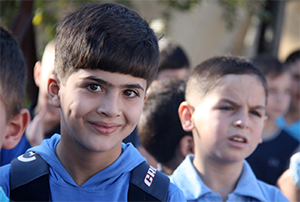School in Palestina: ‘Enkele ouders en tantes koken nu op school en de meisjes verkopen zelf het eten in de kantine’
15 december 2015
Het NIVOZ, vertegenwoordigd door Nickel v.d. Vorm, participeert actief in The Alliance for Childhood European Network Group. Dit netwerk werkt actief aan de verbetering van de 'kwaliteit voor kinderen en jeugd' in de Europese Unie. Dr. Maran vertelde er onlangs over het ELHAM-project in Palestina, over schoolmeisjes die het heft in eigen handen namen en een initiatief opzetten voor gezonde voeding in de school, waardoor zij uiteindelijk de lokale gemeenschap als geheel transformeerden. The Alliance for Childhood European Network Group maakt deel uit van de Alliantie voor het wereldwijde netwerk Partner is The Universal Education Foundation. Beide zijn betrokken bij The Learning for Well-being Community.Regelmatig wordt door de werkgroep van The Alliance for Childhood een ‘Quality of Childhood gesprek’ (QoC-talk) georganiseerd, een variant van The Alliance for Childhood op de NIVOZ-onderwijsavonden in Driebergen, voor iedereen die geïnteresseerd is in de kwaliteit van de kindertijd in de Europese Unie. Deze vinden plaats in het Europees Parlementsgebouw in Brussel. Gijs Verbeek (namens het NIVOZ-Forum) en Rikie van Blijswijk (namens hetkind) waren in september 2015 daarbij aanwezig. Gijs schreef er een (Engelstalig) artikel over.
The Alliance for Childhood European Network Group maakt deel uit van de Alliantie voor het wereldwijde netwerk Partner is The Universal Education Foundation. Beide zijn betrokken bij The Learning for Well-being Community.Regelmatig wordt door de werkgroep van The Alliance for Childhood een ‘Quality of Childhood gesprek’ (QoC-talk) georganiseerd, een variant van The Alliance for Childhood op de NIVOZ-onderwijsavonden in Driebergen, voor iedereen die geïnteresseerd is in de kwaliteit van de kindertijd in de Europese Unie. Deze vinden plaats in het Europees Parlementsgebouw in Brussel. Gijs Verbeek (namens het NIVOZ-Forum) en Rikie van Blijswijk (namens hetkind) waren in september 2015 daarbij aanwezig. Gijs schreef er een (Engelstalig) artikel over.In deze 54ste QoC-talk spreekt Dr. Marwan, President of Khaduri Technical University and co-founder and Secretary-General of the Universal Education Foundation, over het ELHAM-project in Palestina.
ELHAM is een interprofessioneel nationaal partnerschap dat zichzelf als doel heeft gesteld het welzijn van kinderen op Palestijnse scholen te bevorderen. Thema’s van deze QoC-talk zijn de filosofie en de aanpak van het ELHAM-project en tot welke positieve resultaten deze inspanningen hebben geleid. Ook wordt ingegaan op op welke manier dezelfde aanpak in een Europese context kan worden toegepast.
Dr. Marwan start zijn verhaal over een paar schoolmeisjes, die het initiatief nemen voor gezonde voeding in hun school en al doende de bredere leefgemeenschap daarbij weten te betrekken. Zo koken enkele ouders en tantes nu op school, verkopen de meisjes zelf het eten in de kantine en wordt er waar mogelijk gekookt met lokale producten. Uit het artikel van Gijs:
Elham: process and partnerships
Dr. Marwan started his introduction by emphasising that, more than anything else, the Elham project is a process – a holistic, integral and integrated answer, catering to the wellbeing of all children. He also stressed the importance of partnerships, extending from the level of the students on a national level, to partnerships between international partners. He furthermore underscored how having a positive perspective turned out to be helpful for the project, together with a focus on what can be done; and how this process itself has resulted in a deeper level of relationships and partnerships of the people who participated.
How a schoolgirl’s focus on healthy food transformed a local community
As an example, Marwan shared the following story. Although it may be a rather mundane initiative, it did illustrate the transformative power and impact of Elham throughout the community.
The story relates how a group of schoolgirls took on the school cafeteria and the junk food they served there. The girls were fed up with the narrow variety of unhealthy food options they could choose from during lunchtime at school. After reading about healthy food they started speaking with different partners within the school. They managed to change the minds of the rest of the school and in the process they also informed their parents about the importance of eating a healthy diet. The girls lead the initiative and soon after, both the mothers and aunts were brought in to cook for the school kids. While the mothers were cooking healthy, locally produced food, the girls were selling it during lunch break. This cycle created not only healthy diets for the kids during their schooldays, but at the same time also more jobs for mothers, and the local community in general, as a result of the usage of local produce. In this example, the girls became ambassadors for their parents.
Lees het gehele artikel op het Forum


Reacties